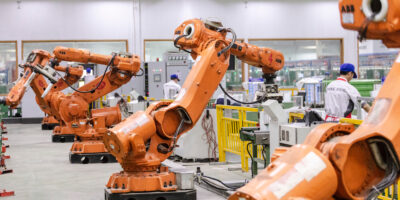
(Source – Shutterstock)
APJ organizations are moving from RPA to Intelligent Process Automation
- IDC APJ automation survey shows 59% of the APJ organizations will use Intelligent Process Automation in over 20% of the total deployments.
- Commissioned by UiPath, the survey also stated that 62% of the organizations in the Asia Pacific and Japan (APJ) will scale up their RPA initiatives or achieve an enterprise-wide RPA deployment
- However, 91% of the organizations still do not have enterprise-wide RPA deployment in place today despite recognizing the importance and benefits
Robotic Process Automation (RPA) has been around for some time. The technology which is designed to ease the workflows of employees by completing repetitive tasks continues to witness updates and innovations as it adapts to organizations.
However, as workloads become heavier and relied on more tech, RPA needs to evolve as well to support employees. Thanks to the advancements of AI, RPA is moving on toward being taken over by Intelligent Process Automation (IPA). As UiPath defines it, IPA basically refers to the application of AI and related new technologies, including Computer Vision, Cognitive automation, and Machine Learning to Robotic Process Automation.
In fact, according to the IDC APJ Automation Survey 2022, commissioned by UiPath, 62% of the organizations in the Asia Pacific and Japan (APJ) will scale up their RPA initiatives or achieve an enterprise-wide RPA deployment. But there is also a greater shift toward Intelligent Process Automation.
Studying organizations across APJ, the survey not only examined the level of automation maturity for the organizations but also how enterprises can scale automation to achieve business growth and outcomes. Fundamentally, 86% of the organizations in APJ agree that automation will be a critical requirement for business excellence, customer experience, and competitive success within the next three years.
Interestingly, while 3 out of 5 organizations will scale up their RPA deployment, the survey also showed that 91% of the organizations do not have enterprise-wide RPA deployment in place today despite recognizing the importance and benefits. This is rather concerning given the fact that most manual office processes today can be completed by RPA.
According to Michael Araneta, Associate Vice President, IDC Financial Insights, business leaders are increasingly acknowledging the pivotal role of automation in resolving their pain points and accelerating growth across the region, against the backdrop of an intensifying competitive climate and turbulent macroeconomic environment.
“While improving operational efficiencies and enriching customer experience have been top of mind for leveraging automation, many organizations also believe that automation is a pathway towards meeting ESG and sustainability goals, which will be a game-changer for corporate trustworthiness. However, despite securing these unprecedented benefits, most organizations have been slow in taking the leap into implementing an enterprise-wide automation program due to myriad yet addressable challenges, including finding automation skills and talent, identifying the right automation software, and ensuring robust security and governance,” commented Araneta.
As automation spending continues to accelerate, the top three business priorities for implementing automation include improving operational efficiencies (63%), streamlining processes (56%) as well as digitizing processes and workflows (48%). Going forward, automation will play a larger role for APJ enterprises by driving new revenue streams, deepening existing relationships with customers, and achieving operational efficiencies.
Meanwhile, at a regional level, automation is becoming a discussion at the C-suite level, with about one in three (32%) APJ respondents acknowledging that their CIOs and CTOs are leading the automation drive towards enterprise-wide adoption.
“Additionally, with the growing significance of environmental, social, and governance (ESG) and sustainability, there is a massive upsurge expected in APJ organizations to garner automation investments for related use cases. Over 30% of the APJ organizations will automate ESG and sustainability use cases next, an increase from 13% in 2022.”, added Araneta.
Barriers to the rise of Intelligent Process Automation
Today, over 90% of organizations in Australia, Singapore, Japan, South Korea, and China underscore their shifting focus toward Intelligent Process Automation. Given that the IPA market in APJ is estimated to grow to US$5.5 billion in 2025, this highlights the necessity and potential to go beyond RPA to achieve comprehensive end-to-end process automation at scale.
The report stated that in the next three years, 59% of the APJ organizations will use IPA in over 20% of the total deployments.
Yet, there are still several issues that are hampering its deployment. Among them include the talent crunch. Demand for automation skills and talent continues to increase and remains scarce in most countries. As a result, 53% of organizations said that the availability of skilled automation talent and strong implementation partners’ support is key when selecting automation solutions, while 50% said they look out for end-to-end enterprise-grade solutions with modern and modular architecture.
Across APJ, 44% of the organizations already have non-IT domain employees involved in automating aspects of their work, while 39% plan to get their employees involved. In particular, the banking and insurance industry is leading the pack, with 56% of non-IT domain employees already involved in automation, followed by the telecommunications (50%) and retail (49%) sectors.
As more organizations integrate automation in the work of non-IT domain employees, respondents highlighted that collaboration with IT (33%), clear guidance on best practices (21%), and easy-to-use tools (19%) are the key requirements for successful implementations. Additionally, organizations will need to develop a comprehensive training and development plan with a focus on reskilling and upskilling across teams and units, which only 38% of the APJ organizations are currently doing.
For Scott Hunter, Vice President, Customer Strategy and Solutions Lead, Asia Pacific and Japan, UiPath, organizations across APJ clearly recognize the need to make enterprise-wide automation a reality to realize productivity gains, cost savings, and enhanced customer experience among many other benefits. However, Hunter believes the reality remains that the majority of them are facing challenges to scale automation across all aspects of the business.
“To level up their automation initiatives, organizations must elevate their automation mindset by leveraging a holistic strategy with executive buy-in, coupled with a robust employee upskilling and training program to automate at scale in the APJ region,” explained Hunter.
READ MORE
- The criticality of endpoint management in cybersecurity and operations
- Ethical AI: The renewed importance of safeguarding data and customer privacy in Generative AI applications
- How Japan balances AI-driven opportunities with cybersecurity needs
- Deploying SASE: Benchmarking your approach
- Insurance everywhere all at once: the digital transformation of the APAC insurance industry


